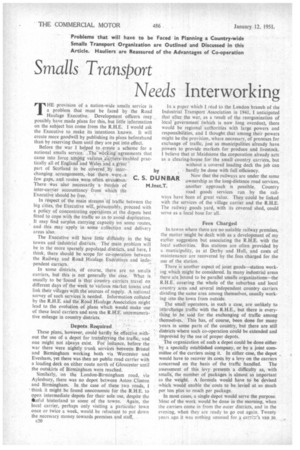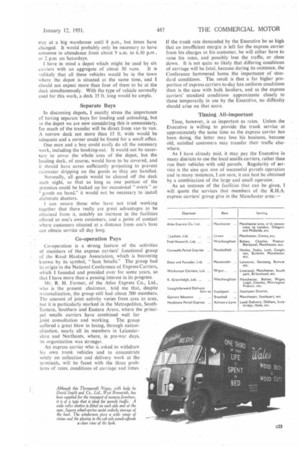Smalls Transport Needs Interworking T HE provision of a nation-wide smalls
Page 58

Page 61

If you've noticed an error in this article please click here to report it so we can fix it.
service is a problem that must be faced by the Road Haulage Executive. Development officers may .. possibly have made plans for this, but little information on the subject has come from the R.H.E. I would ask the Executive to make its intentions known. It will create more goodwill by publishing its plans beforehand than by reserving them until they are put into effect.
Before the war I helped to create a scheme for a national smalls service. . The' wkiiing. agreements that came into force atnrIng vahous_ic'arriersenabled practically all of England and Wales and a great ' part of Scotland to be covered,, by inter-. changing arrangements, but there were.la
few gaps, and routes were often. circuitous: There was alsci necessarily 'a burden of inter-carrier accountancy from which the Executive should be free. . ..
In respect of the main streams dl traffic between the big cities, the Executive will,iresumably, proceed with a policy of concentrating operations at the depots best fitted to cope with the traffic so as to avoid duplication. It may find surplus carrying' capacity on some routes, and this may apply in some collection and delivery areas also.
The Executive will have little difficulty in the big towns and induStrial districts. The main problem will be in the more sparsely populated districts, and here, I think, there should be scope for co-operation between the Railway and goad _Haulage Executives and independent carriers.
In some districts, of course, there are no smalls carriers, but this is not generally, the Case. What is usually to be found is that country -carriers travel on different days of the week to various Market towns" and link their villages with the sources of supply. A national survey of such services is needed. Information collated' by the R.H.E. and the Road Haulage Association might lead to the evolution of plans which would make use of these local carriers and save the R.H.E. unremunerafive mileage in country districts.
Depots Required ,
These plans, however, could hardly he effective without the use of a depot for transferring the traffic:and one might not aLways exist. For .1rOance, before the war there were nightly trunk services -between: Bristol and Birmingham working both via Worcester and Evesham, yet there was then no public road carrier with a loading deck on either route north of Gloucester until the outskirts of Birmingham were reached.
Similarly, 'on the London-Birmingham road, via Aylesbury, there was no depot between Aston Clinton and Birmingham. In the case of these two roads, I think it might be found uneconomic for the R.H.E. to open intermediate depots for their sole use, despite the titeful hinterland to some of the towns. Again, the local carrier, perhaps only visiting a particular town once or twice a week, would be reluctant to put down the necessary money towards premises and staff.
c20 In a piper which 1 read to the London branch of the Industrial Transport Association in 1941, I anticipated that after the war, as a result of the reorganization of local government (which is now long overdue), there would be regional authorities with large powers and responsibilities, and I thought that among their powers might be the provision, where necessary, of premises for exchange of traffic, just as municipalities already have powers to provide markets for produce and livestock. I believe that at Maidstone the corporation already acts as a clearing-house for the small country carriers, but without a covered loading deck the job can hardly be done with full efficiency.
Now that the railways are under the same ownership as the long-distance road services, another approach is possible. Country road goods services run by the railways have been of great value. They could be linked with the services of the village carrier and the R.H.E. The railway goods yard, with its covered shed, could serve as a local base for all.
Fees Charged In towns where there are no suitable railway premises,
the matter might be dealt with as a development of my earlier suggestion but associating the R.H.E. with the local authorities. Bus stations are often provided by a municipality, as at Derby and Hull, and costs of maintenance are recovered by the fees charged for the use of the station.
There, is another aspect of joint goods—station work ing which might be considered. In many industrial areas there are. bound to be parallel smalls organizations—the R.H.E. covering the whole of the suburban and local country area and se-veral independent country carriers dividing the same area among themselves, usually working into the town from outside.
The small operators, in such a case, are unlikely to interchange traffic with the R.H.E., but there is everything, to be. said for the exchanging of traffic among themselves... This has, of course, been done for many years in some parts of the country, but there are still districts where such co-operation could be extended and improVed by the use of proper depots.
The organization of such a depot could be done either by a specially established company, or by a joint committee of the carriers using it. In either case, the depot , would have to recover its costs by a levy on the carriers concerned on the basis of the traffic handled. The assessment of this levy presents a difficulty as, with smalls, the number of 'packages is almost as important as the weight. A. formula would have to' be devised which would enable the costs to be levied at so much per ton plus so much per package.
In most cases, a single depot would serve the purpose.
Most of the work would be done in the morning, when the carriers come in from the outer districts, and in the evening, when they are ready to go out again. Twenty years ago it was nothing unusual for a carri-.:7's van to,
stay at a big warehouse until 8 p.m., but times have changed. It would probably only be necessary to have someone in attendance from about 9 a.m. to 6.30 p.m. or 2 p.m. on Saturdays.
have in mind a depot which might be used by six carriers with an aggregate of about 30 vans. It is unlikely that all these vehicles would be in the town where the depot is situated at the same time, and I should not expect more than four of them to be at the deck simultaneously. With the type of vehicle normally used for this work, a deck 35 ft. long would be ample.
Separate Bays In discussing depots, I usually stress the importance of having separate bays for loading and unloading, but in the depot we are now considering this is unnecessary, for much of the transfer will be direct from van to van. A narrow deck not more than 15 ft. wide would be adequate and a corner could be found for a small office.
One man and a boy could easily do all the necessary work, including the booking-out. It would not be necessary to cover the whole area of the depot, but the loading deck, of course, would have to be covered, and it should have eaves sufficiently projecting to prevent rainwater dripping on the goods as they arc handled.
Normally, all goods would be cleared off the deck each night, so that as long as one portion of the premises could he locked up for occasional " overs " or " goods on hand," it would not be necessary to install elaborate shutters.
I can assure those who have not tried working together that there really are great advantages to be obtained from it, notably an increase in the facilities offered to one's own customers, and a point of contact where customers situated at a distance from one's base can obtain service all day long.
Co-operation Pays
Co-operation is a strong feature of the activities of members of the express carriers' functional group 'of the Road Haulage Association, which is becoming • known by its symbol, "Stith Smalls." The group had its origin in the National Conference of Express Carriers, which I founded and presided over for some years, so that I have more than a passing interest in its progress.
Mr. R. H. Farmer, of the Atlas Express Co., Ltd., who is the present chairman, told me that, despite n:ttionalization, the group still had about 500 members. The amount of joint activity varies from area to area, but it is particularly marked in the Metropolitan, SouthEastern, Southern and Eastern Areas, where the principal smalls carriers have combined well for joint consultation and working. The group suffered a great blow in losing, through nationalization, nearly all its members in Leicestershire and Northants, where, in pre-war days, its organization was stronger.
An express carrier who i asked to withdraw his own trunk vehicles and to concentrate solely on collection and delivery work at the terminals, will be faced with the three problems of rates, conditions of carriage and times If the trunk rate demanded by the Executive be so high that an insufficient margin is left for the express carrier from his charges to his customer, he will either have to raise his rates, and possibly lose the traffic, or close down. It is not quite so likely that differing conditions of carriage will be fatal, because during its existence, the Conference hammered home the importance of standard conditions. The result is that a far higher proportion of express carriers to-day has uniform conditions than is the case with bulk hauliers, and as the express carriers' standard conditions approximate closely to those temporarily in use by the Executive, no difficulty should arise on that score.
Timing All-important
Time, however, is as important as rates. Unless the Executive is willing to provide the trunk service at approximately the same time as the express carrier has been doing, the latter may lose his business, because old, satisfied customers may transfer their traffic elsewhere.
As I have already said, it may pay the Executive in many districts to use the local smalls carriers, rather than run their vehicles with odd parcels. Regularity of service is the sine qua non of successful parcels operation and in many instances, I am sure, it can best be obtained by a combination of the large and small operator_
As an instance of the facilities that can be given, will quote the services that members of the R.H.A. express carriers' group give in the Manchester area:—




































































































